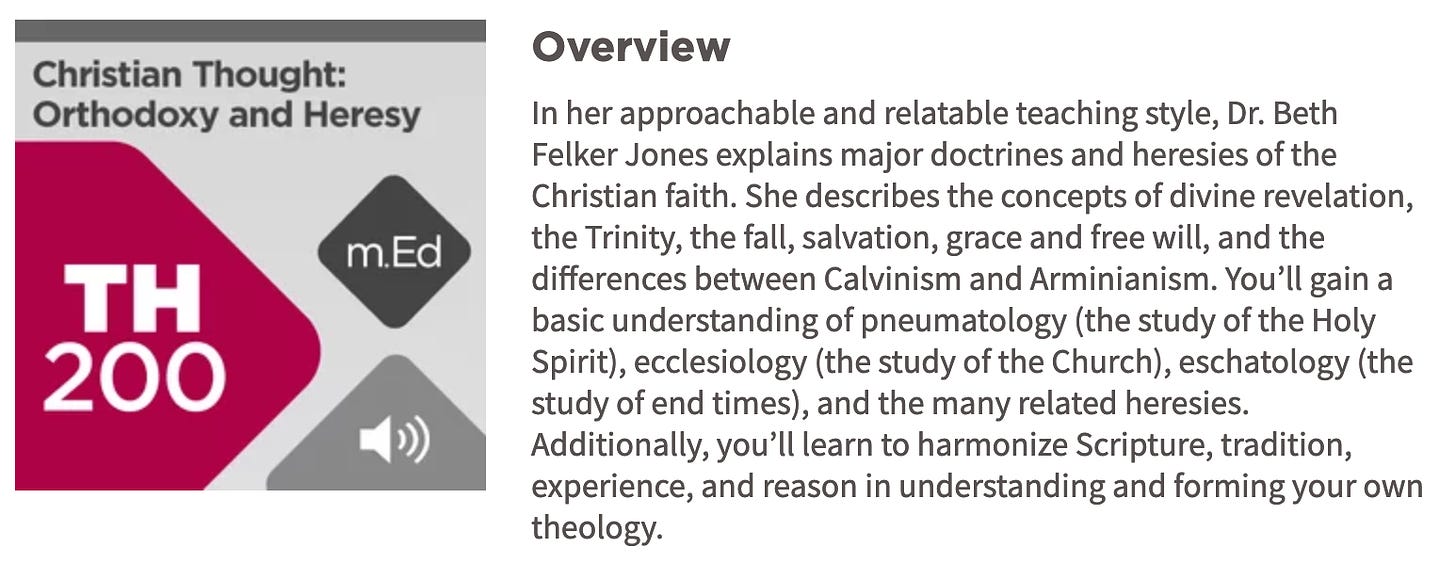Gentle reader,
When asked if he would use a Bible commentary written by a woman, John Piper gave an odd and telling answer.
The problem with women teaching, says Piper, is not that women are incompetent (thanks JP!). The problem is “the dynamic between how men flourish and women flourish as God designed them to flourish.”1
Piper claims that we can “distinguish between personal, direct exercises of authority that involve manhood and womanhood, and indirect, impersonal exercises of authority which don’t concern gender.” Those “personal direct exercises,” he is saying, will interfere with that dynamic where men and women flourish in relationship to each other.
An “impersonal” interaction with an authoritative woman, supposes Piper, has “no dimension of maleness or femaleness about it.”
Because Piper classifies reading a book by a woman as “impersonal,” he considers it licit to do so (thanks again, JP!).
Actually, he says this; reading a book “puts the woman as author out of the reader’s sight and, in a sense, takes away the dimension of her female personhood.”
Piper can read a book written by a woman.2 What he will not do is learn from a woman who is in the room with him.
There are some weird things about this, but, before I talk about them, let me briefly describe gnosticism.
The word “gnostic” is used in theology to refer to patterns of teaching akin to the teachings of ancient groups, called “gnostic” because they claimed special knowledge (gnosis) of salvation. Early on, Christian theology rejected gnosticism as incompatible with the way God is revealed in scripture.
The most important difference between Christian thought and gnostic thought has to do with the body.
In gnosticism, the body, along with materiality, is bad. The body is a problem to be solved or erased. Salvation involves escape from the body. Gnostic dualism sorts the world into two categories, material and spiritual, and considers the material to be evil.
Christian thought cannot go along with this. For Christian faith, God is:
“maker of heaven and earth,
of all things visible and invisible.” (The Nicene creed, which is quoting scripture)
That is, all things, including matter and bodies, come from God and are good because God has said so (Genesis 1). The body is not a problem to solve. The body is a good creation, intended for final redemption. Christians are a people who look forward to “the redemption of our bodies” (Romans 8:23). God loves us, body and soul.
This makes Piper’s teaching, as I said above, weird. Or, we might say it makes it gnostic.
First, it seems that the problem with women as teachers rests squarely with their female bodies. Breasts in the room are threat to men.
Piper assumes a sharp body-soul dualism. A woman’s book, which can be sheered off from her body, can be allowable. A woman’s body is a problem.
It’s also quite strange to suppose that a woman’s book (or anybody’s book) can be received “without the dimension of her female personhood” or without concerning gender. My books concern my gender. Sometimes I talk about this directly, but even when it’s unsaid, my experiences as a gendered human being are part of anything I write. John Piper’s books are gendered too; they can’t be separated from his male experience and male body. All human things are gendered. Humans don’t make generic things. We make particular, personal, embodied things.
If women are a threat to men, it’s best not to read books by women.
And to suggest that reading a book without any dimension of gender attached would be a good thing is also … well … pretty gnostic. It imagines some immaterial realm in which pure knowledge and truth can be received, unsullied by material things like femaleness.
When Piper would prohibit female seminary professors (sorry, not sorry JP!), he has this to say; “The proper demand on the seminary teacher is to be an example, a mentor, a guide, an embodiment of the pastoral office in preparing men to fill the pastoral office.”3
Except for the part where he fails to wrestle with the facts that women are made in the image of God and that women teach alongside men in the New Testament, Piper sounds a lot more Christian here than he did in what we saw above. He rightly acknowledges that teaching is embodied. And for him, that has to mean that a woman’s body, in a seminary classroom, can only be a threat.
I wonder if this kind of gnostic logic doesn’t inspire complementarian thought at a more basic level. If bodies are good, if bodies matter, then one doesn’t need to go beyond the body to explain why God created humans with sexual differentiation.
If bodies are good, one can explain embodied difference as, in itself, good.
But if bodies are unimportant or problematic one has to go looking for another, extra-bodily, explanation of sexual difference. One needs something like “leadership” and “submission” or the like, as if embodied diffrence couldn’t matter on its own, as if we needed meaning separate from bodies, as if such a thing were even possible for humans.
Someone once asked Augustine if women could be in the room without threatening men. (The precise question: would there be women in the resurrection?)
Augustine is confident that God made women’s bodies, loves women’s bodies, and will include women’s bodies in final redemption. He’s not threatened.
Augustine says, “the sex of a woman is not a vice, but nature.”
He says, “the female parts will nonetheless remain in being, accommodated not to the old uses, but to a new beauty, which will move us to praise the wisdom and clemency of God.”4 When Augustine imagines the kingdom to come, there are breasts in the room. Praise God.
Grace & peace,
BFJ
This piece contains associate links. As always, I’m grateful if you choose to subscribe, forward, or share.
Interested in taking an audio course, with me, on the basics of Christian thought? Available at Logos.
Amazon Fresh offers grocery delivery on tens of thousands of products – from a complete grocery selection to everyday essentials, toys, gifts and more. Try it now.
Get a 6 month trial of Amazon Prime for students.
“Do you use Bible commentaries written by women?” at Desiring God, March 27, 2013. I don’t care to link directly to Piper’s piece, but if you’d like to look, here’s a broken link you can put back together in order to read it:
https://www.desiringgod.org/interviews/do-you-use-bible-com mentaries-written-by-women
I’d be curious about how many books by women he’s actually read, but he doesn’t rule such reading out of court.
“Is there a place for female professors at seminary?” at Desiring God, January 22, 2018. If you want it, here’s another broken link for you:
https://www.desiringgod.org/interviews/is-the re-a-place-for-female-professors-at-seminary
Translated by R.W. Dyson, The City of God Against the Pagans, 22.17.1144-1145.









I am late to engaging with this post but wanted to say that I had never thought of Piper’s position as a form of Gnosticism. It makes me wonder how he’d recommend a book by a female if he found it of value!